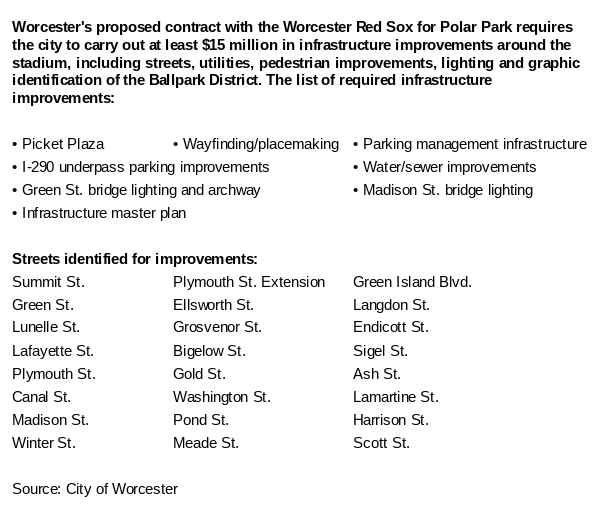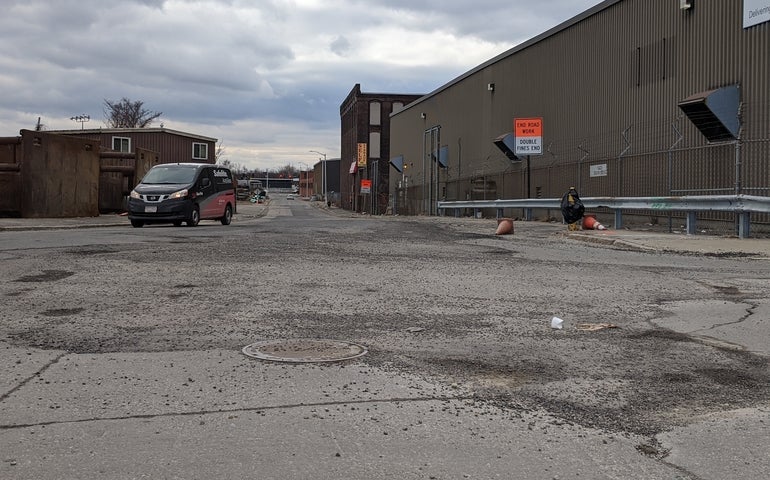A proposed lease agreement between the Worcester Red Sox and the City of Worcester commits the city to at least $15 million in infrastructure improvements around Polar Park in addition to the ballpark’s roughly $157-million cost.
The city is responsible for a list of 32 improvements in the proposed lease, including several major streets near the ballpark, such as Green and Madison streets. The city is also liable for new signage in the neighborhood, lighting railway underpasses and water and sewer improvements.
That work must add up to at least $15 million under a proposed lease between the team and the city that was made public Friday and must be approved by the Worcester Redevelopment Authority, an arm of the city government that acts as the landlord for Polar Park. The authority is due to meet on Friday.
City Manager Edward Augustus said in a statement Tuesday that the infrastructure work, though required under the lease, consists of projects that have been long overdue in the neighborhood, including street and sidewalk repairs and water and sewer improvements that will help reduce flooding. The improvements total about $18.2 million: $5.4 million in city capital funding and the remainder from state and federal sources.
“The City has secured funding from a variety of external sources, bringing in new dollars that would have been spent outside of the City if not for the ballpark project,” Augustus said.
Some of the work has already begun, including new paving and sidewalks on Madison Street, new paving on Green Street and new sidewalks on Lodi Street. Other work remains ongoing, including along Lamartine Street.

That previously unreported infrastructure work, which was also part of the initial letter of intent between the city and the then-Pawtucket Red Sox, adds considerably to public investment in and around Polar Park, all spanning a radius of about five blocks around the ballpark.
Costs for building the city-owned ballpark have risen to roughly $157 million, including buying and demolishing buildings that stood in the way of the ballpark and paying businesses to relocate. Those costs were initially $101 million, and they rose by roughly one-third before the coronavirus pandemic hit, during which costs rose further.
Among other public costs, the state has contributed more than $30 million to build a parking garage on Madison Street across the street from the ballpark and for housing subsidies in the mixed-use development planned for that site. Construction hasn’t yet started on either aspect. The state is also covering $16 million for remaking the Kelley Square intersection about a block from the ballpark, and $3.5 million to upgrade the Pickett municipal parking lot into a plaza between Green Street and the north entrance to Polar Park that’s due to open for the 2022 season.
The city is also waiving $2.25 million in permitting fees for the Madison Street mixed-use development and has offered five tax breaks as incentives.
City officials expect new property tax revenue from a series of proposed projects to bring in more than enough new funds to pay for the city’s costs related to the stadium.
The Worcester City Council has at least one more financial approval to make for Polar Park: $14 million in borrowing to help cover a $17-million cost overrun made public on Friday. The team is due to cover the $17-million amount through up-front costs and repayments to the city.
Among changes to the lease announced Friday, the term has been extended to 35 years from 30, and the team can’t opt out of the agreement until at least 25 years instead of an initial 15. An initial city guarantee for corporate sponsorship revenue has been removed through 2025, and the city’s potential penalty for not finishing the ballpark on time has also been reduced.

